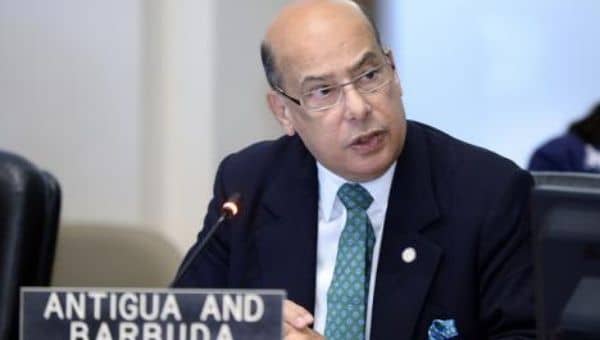
By Sir Ronald Sanders
(The writer is Antigua and Barbuda’s Ambassador to the U.S. and the OAS and Senior Fellow at the Institute of Commonwealth Studies at the University of London and at Massey College in the University of Toronto. The views expressed are his own)
Demands of the rich man’s club, the Organisation for Economic Cooperation and Development (OECD), have once again created disarray in the Caribbean.
It is a disarray to which Caribbean countries have contributed by their lack of a common and strong political response to the many impositions by the OECD on the global financial sector since 1998 when the Organisation first launched what it called its “harmful tax competition initiative”.
For two decades, the OECD has been systematically and resolutely, forcing Caribbean countries and other developing states, to dismantle their tax structures and international business regimes, some of which, as in the case of Barbados, have been in place for over 40 years.
These international business regimes allowed International Business Corporations (IBCs) to pay low or no tax, which the OECD claimed deprived them of tax revenues. Instead of lowering their tax rates to compete; they chose to eliminate the competition.
However, IBCs brought crucial revenues in foreign currencies to Caribbean governments. In the case of Barbados, Prime Minister Mia Mottley revealed that “for every one dollar in corporation taxes paid by domestic companies” the Barbados government “received almost two dollars of corporation taxes from international companies”.
In other Caribbean jurisdictions, with the possible exception of the Bahamas, Bermuda, British Virgin Islands and Cayman Islands, the Barbados story is not dissimilar except for two factors. First, Barbados has more IBCs that many Caribbean countries, apart from the four jurisdictions just named; and second, over the last two decades, OECD imposed rules have eroded both the number of IBC’s and the revenues they have generated in countries such as Antigua and Barbuda, Grenada and St Lucia.

The latest OECD salvo is its ‘Base Erosion and Profit Shifting’ (BEPS) scheme which, in a nutshell, on pain of sanctions, stops jurisdictions from providing IBCs with low or no tax regimes and requires that all companies, domestic and international, pay the same rate of tax. The BEPS initiative was launched in November 2015, and countries that are not in compliance by the end of 2018 will be blacklisted and punished unless, in special circumstances, they have been given a grace period in which to conform.
Hence, Ms Mottley, whose government is in the midst of a massive operation to salvage a wrecked economy that it inherited just six months ago, has announced that by January 1st, 2019, Barbados will converge its local and international tax rates.
Significantly, the Barbados government has decided to converge to the lower tax rate. Effectively, this means that domestic companies that paid corporation taxes of up to 25 percent will now join IBCs by paying between 1 and 5.5 per cent.
In making this announcement, Ms Mottley made two statements that have significance for the wider Caribbean.
First, she pointed out that it was the previous government’s decision to commit to the OECD demands and to overhaul the tax system by year-end, something done “in the dead of night without debate and discourse and even worse, without any plan as to how they were going to achieve it”.
Second, in stating that her government recognised that, without sufficient time to negotiate any change to the commitment given by the previous government, it was compelled to comply, it was doing so although “the pressure from the OECD may be hypocritical, bullying, and an affront to natural justice”.
Of course, making commitments to the OECD on a bilateral basis and without discourse with relevant parties within their own countries prior to such commitments, is not unique to Barbados. There has also not been a collective and unified Caribbean engagement with the OECD, at a high political level. Individual governments have simply signed-up to OECD requirements and their Ministers have presented their acquiescence to Caribbean publics as a “victory”, imaginary and misleading though such assertions were.
So, all the Caribbean countries now have to confront the reality that Ms Mottley and her government faced. Adherence to the OECD’s BEPS scheme is less than a month away when IBCs and domestic companies will have to pay the same rate of tax.
No one can blame the Barbados government for setting this new tax standard in order to remain competitive because of the circumstances occasioned by the OECD. But the consequences for other Caribbean countries will be serious.
By choosing the lower tax rate “to remain globally competitive”, the Barbados government has set a bar for other Caribbean jurisdictions that compete with Barbados as well as globally. Can they now opt to set their corporation tax at the present domestic rate – an average of 30 per cent – or should they adopt the Barbados standard of between 1 and 5.5 per cent?
For some governments, applying the new Barbados standard would cripple their economies. Over the last 20 years, the number of their IBCs has been decimated by OECD demands. Today, revenues from IBCs do not match the income generated from domestic companies. Therefore, these governments will have to converge their local and international tax at the domestic rate. But, the effect will drive away even more IBCs. It may also cause some Caribbean companies to shift operations to Barbados.
Other Caribbean countries, that have a greater dependence on IBCs than on domestic companies, have a choice of matching the Barbados standard or converging their tax rates even lower. A race to the bottom could be triggered.
The success of the Barbados standard of a converged, low tax rate for IBC and domestic companies will be tested in the coming years. There is a risk that revenues to the government might decline. However, the expectation is that: first, the IBC business will increase; and second, the fiscal space that domestic companies will enjoy from much lower taxes will encourage them to invest in expanding their business and employing more people, rather than pocketing bigger profits.
Dealing with these disruptive circumstances, because of external factors, cries out for collective regional action which, had it been taken in a timely manner, would have better placed every country to cope with them.
Advertise with the mоѕt vіѕіtеd nеwѕ ѕіtе іn Antigua!
We offer fully customizable and flexible digital marketing packages.
Contact us at [email protected]
















Can it be said that: experince is the hardest kind of teacher. It gives you the test first, then the lesson afterwards? Oscar Wilde
DELUSIONAL
Unlike the United States that has Rules as to how US-based operated companies shall operate, and where they may operate offshore, the ‘OECD’ is ensuring that it sets the ‘…Rules of operation’ for regional nations. None is to be exempt from its Rules.
Consequently, these nations are often coerced into enacting laws not in their national economic interests, but to meet the objectives of, as Sir Ron aptly describes it, ‘…the Rich man’s Club.’
None may harbor illusions of the intent of the actual imposition of ‘…Blacklisting Sanctions’ or the threat of it being imposed on regional countries for behavior suggesting ‘…non-compliant.’
Sir Ron is certainly not, but anyone who believes that ‘…speaking with one voice’ to these regimes that set up organizations with strict rules and conditionalities for indigent nations to follow, might be seen as ‘…Delusional.’
This is reminiscent of the game of cricket when the West Indies had the fearsome speed bowlers of ‘…Sir Wesley Hall and Charlie Griffith.’
Crippling the bowling, Umpires accused Charlie Griffith of ‘…chucking.’ Though it was for safety, opponents were fearful of defeat. The Australians were forced to send for ‘…Helmets.’
Then there were additional Rules limiting the number of bouncers in one over; …width and height of bowling.
If slightly too far away from the batsman-a wide; and if to high over his shoulder, even when ducking low, a ‘…No ball.’ These are the Rules of play today.
As the game game evolved the Rules also evolved. This can be seen in the limited 50- overs and even in the Twenty/20 games.’
Moreover, if there was intervention by rain, the ‘…Duck worth-Lewis Rule’ would determine who wins on ‘…faster rate of scoring.’
Introduced on January 1, 1997, it has been called the ‘…Farcical Rain Rule’-(Match Zimbabwe/England) [Wikipedia].
These nations have no natural resources, and with very little to export, to survive most have looked to other streams for revenue generation. There is brittle industry called Tourism, and now ‘…offshore betting on gaming and allowing for other international business operations.
Apart from ‘…food and clothing and oil and technologies for energy’ to run their governments and grow their economies, they also have to lure ‘…International Business Corporations or as it were, ‘…encourage ‘Foreign Direct Investments’ that very often have to be incentivized.
The ‘OECD’ see these weak economy-struggling nations as providing ‘…Tax Havens,’ and would have none of this.
It sets ‘Rules’ for countries outside the Club. They shall play whatever game they wish to play, but they shall be guided by the Rules of play.
Whether before or during play (not after), they shall give legal effect to the Rules by ratifying them in their respective Parliaments.
While Sir Ron continue to urge ‘…speaking with one voice’ and taking ‘…collective external action’ on these issues, since they want to be associated with the rich man’s club, ‘…strict compliance’ is all everyone would see.
Nothing ‘…imaginary or misleading.’ That is the way all shall ‘..cope with the OECD.’
Can it be said that: experience is the hardest kind of teacher. It gives you the test first, then the lesson afterwards? Oscar Wilde
I really like Ambassdor Sanders, but he fights back against the OECD is a way that is too ‘academic’.
Antigua and other Caribbean nations need to fight back against the OECD by aligning financial network connectivity with China and non-OECD countries.
Let the OECD blacklist us and then we can pass Antigua laws that double down on being an offshore banking center.
Ambassador Sanders should also highlight his the OECD gives Singapore a ‘pass’ even though it is one of the worst offshore banking centers in the world. It just so happens that Singapore let’s USA Navy ships dock there…
Comments are closed.